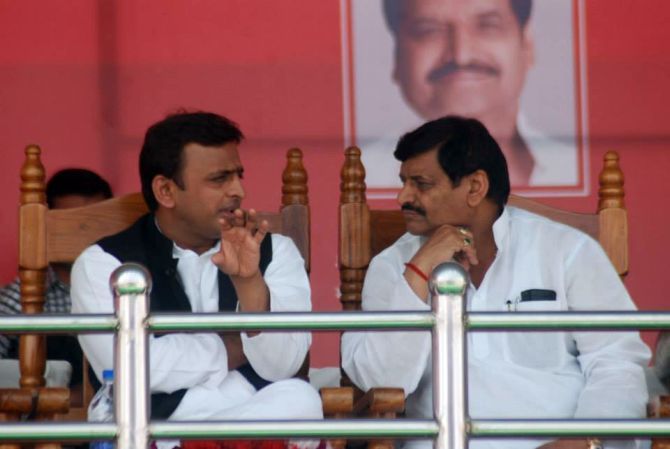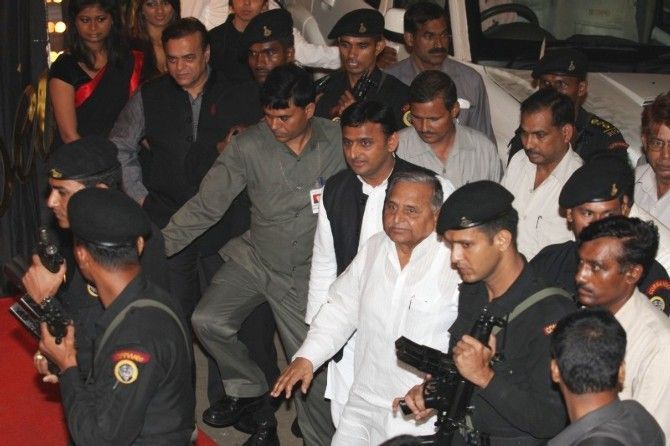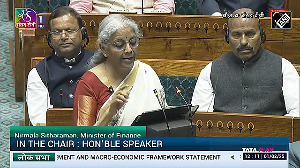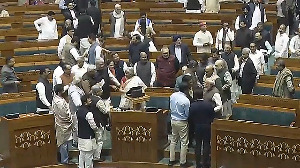
'If you interpret Akhilesh's statement, he is clearly saying Shivpal wants to become chief minister.'
What is the problem between Uttar Pradesh Chief Minsiter Akhilesh Yadav and his uncle Shivpal Yadav?
If you are pondering this question, then Dr A K Verma, director, Centre for the Study of Society and Politics, Kanpur, has the answers.
He spoke to Rediff.com's Syed Firdaus Ashraf about the crisis in Uttar Pradesh's Samajwadi Party and how it can benefit the Congress.
How do you see this family crisis in the Samajwadi Party and the tussle between Akhilesh and Shivpal Yadav?
The crisis was brewing for long and it was only a matter of time before it erupted.
Shivpal could never digest this fact that Akhilesh was made chief minister.
Shivpal was always considered the de facto chief minister. So when Akhilesh was elevated, Shivpal felt marginalised.
It was said in Lucknow that Akhilesh was a half chief minister (the other half being Shivpal). Basically meaning that Shivpal was demonstrating his supremacy in government and Akhilesh somehow tolerated his dominance because of family consideration.
Now probably he (Akhilesh) has developed some kind of courage to say 'no.'
The moment he did so, then there was a head on (fight) with Shivpal.
Did people vote for Akhilesh Yadav in 2012 or for the Samajwadi Party?
That was not the issue. The election was run and fought by Mulayam Singh Yadav.
Akhilesh was not the chief ministerial candidate in the 2012 assembly elections. Therefore, it was a surprise when Mulayam propped him up as chief minister.
Had he been the chief ministerial candidate, probably Shivpal would have not been angry about this decision.
The Samajwadi Party fought the elections of 2012 with the face of Mulayam Singh Yadav as the chief minister. After forming the government he suddenly took a U turn and brought in Akhilesh.
This was so sudden that Shivpal could not react to this arrangement. Internally, it was never decided that Akhilesh would be the chief minister.
Why was Akhilesh made chief minister?
I would say Mulayam felt and understood that he had played his innings. He first became chief minister in 1989. He had experience in running the state. His passing on the post to his son is natural in an Indian setting because so many politicians do the same.
The interaction I had with top Samajwadi Party leaders on this issue gave me an idea that the top leadership were worried about the criminal tag to the party.
They wanted to bring in some person who had a clean image and therefore they got in Akhilesh Yadav.
He was young, Western educated and polished. He was a novice and A different persona from others in the party.
People also had lot of hopes when he was brought in. Mulayam thought by bringing in Akhilesh he would take the SP to a different trajectory which will be clean, governance-oriented and developmental-centric.
He also understood his younger brother Shivpal was in UP politics for long, but also knew that Shivpal will not win elections for the party.
He knew Shivpal might have a hold on the heart and mind of party cadres, but unless you have a hold on the hearts and mind of the people you cannot win elections.
That is why Mulayam brought in Akhilesh.
Do you feel that Akhilesh now wants to assert himself by taking control of the party? He did not allow the entry of the controversial Mukhtar Ansari (who was backed by Shivpal Yadav) into the Samajwadi Party.
I would look at this move as a little late. Had this courage been demonstrated a little earlier Akhilesh would have the time to mould public opinion.
By this time public opinion has almost been formed and it is the only floating voters of 7 to 8 per cent who normally decide the fate of an election.
Can Shivpal split the Samajwadi Party?
Splitting a party is one thing and being a strong leader is another.
Many people in the past thought that they were strong enough to split the party. In 1969, many leaders split the Congress to form the Congress-O and you know what happened to them. They all got marginalised.
Right now, Shivpal has a huge hold on the cadres. Therefore, Akhilesh has been dropped as UP president of the party and Shivpal has replaced him.
The issue here is that even if Shivpal has a hold over the party ranks is he popular in the public domain? Are the people with you or not?
In the event if there is a comparison between Akhilesh and Shivpal, I would say people would side with Akhilesh.
What is the reason for the tension between Akhilesh and Shivpal Yadav?
Most people say it is a family issue, but Akhilesh has denied it. He clearly said this is not a family issue, but a feud in the government.
If you interpret Akhilesh's statement, he is clearly saying Shivpal wants to become chief minister. That is the indication and the signals are very clear.

Where does Mulayam Singh Yadav stand in this rift? Akhilesh refused to go to New Delhi when his father summoned him.
Mulayam is the supremo of the party. He is called Netaji by his cadres.
The issue is that Mulayam is now an outdated ticket in the Samajwadi Party. He might be Akhilesh's father, but so far as the politics of the state is concerned, Mulayam is slowly becoming outdated for one simple reason.
Mulayam is himself responsible for the dilution of the ideological aspect of the party.
There is only one mentor of the party and it is on the party's Web site. He is Dr Ram Manohar Lohia and nobody else.
Now look at the policies that the Samajwadi Party has followed over the years. You will find there is hardly any samajwadi left in its policy or ideology. They have hardly followed Dr Lohia's policy.
It is a very sad commentary on Mulayam Singh that he did not take care of the ideological moorings of Dr Lohia.
Secondly, the Samajwadi Party has always been looked upon as a party monopolising the votes of the OBCs (Other Backward Classes) in alliance with the Muslims. Mulayam was always considered the protector of OBCs and he has completely failed to do so.
OBCs are divided into three categories in Uttar Pradesh. One category are the Yadavs, the second category are the more backward in which you have Kurmis, Koeris, Patels, Lodhs etc. There are eight such types. The third is the most backward in the OBCs and they have 70 castes in this category.
Now if you look at the OBC population in UP, you will find that 20 per cent are Yadavs, 19 per cent are more backward and 61 per cent are most backward. This is a very huge number in terms of population of the state.
The OBC population is 41 per cent in UP. Had Mulayam tried to focus on the homogenisation of OBCs in UP, then things would have been very different from what they are right now.
He chose 'Yadavisation,' rather than the homogenisation of OBCs.
This was Mulayam's second blunder. He did not mobilise the OBCs into a dominate group.
Thirdly, he allowed the party to be hijacked by criminal elements so the people of UP are very angry with the Samajwadi Party. Whatever development the party might have done is fine, but law and order is a problem.
Is Amar Singh responsible in any way for this crisis in the family?
He has come quite late into the Samajwadi Party. One can say with his established brand and nature that he is the facilitator to this crisis, but he is not the creator.
Which party benefits most because of this crisis
The Samajwadi Party will be a great loser. I think the Congress stands to gain a lot.
Not the Bahujan Samaj Party?
No. The support group of the Samajwadi Party are Yadavs and Muslims. The Yadavs will probably continue to be with the Samajwadi Party irrespective of the family feud, but the Muslims will certainly like to migrate here and there.
One very important component would be the Congress because it has drawn a certain strategy and it is a strong contender in 80 assembly constituencies.
PK (Prashant Kishore) has adopted a strategy where he is persuading Congress MP candidates in the 2014 parliamentary elections to come and contest the assembly elections.
An MP normally contests five assembly constituencies and if that MP comes and contests one of the assembly constituencies, then that would be very easy for them to win.
Should they all agree to this proposal of PK, then the Congress would certainly be a contender in 80 constituencies.
Should that happen, then the Muslims will feel the Congress is coming back and may migrate to the party.











 © 2025
© 2025